Managing Culture Shock: IHRM Policies & Practices - Unilever Example
VerifiedAdded on 2023/06/14
|5
|1471
|424
Essay
AI Summary
This essay explores the phenomenon of culture shock experienced by expatriates during international assignments and discusses the critical role of international Human Resource Management (HRM) policies and practices in effectively managing it. It defines culture shock as a personal disorientation arising from unfamiliarity with a new cultural environment, encompassing organizational, personality, cultural, linguistic, and environmental factors. The essay highlights that culture shock can lead to depression, reduced job performance, and assignment failure. To mitigate these issues, the essay suggests implementing standardized selection tests, cross-cultural training programs (didactic and experimental), motivation through rewards, and intercultural programs. The success of Unilever in managing culture shock through comprehensive global training programs, which address cultural, economic, legal, and linguistic aspects, is presented as an example. The essay concludes that proactive HRM policies and practices are essential for creating awareness and equipping expatriates with the skills to navigate cultural differences, ultimately improving their adjustment and performance.
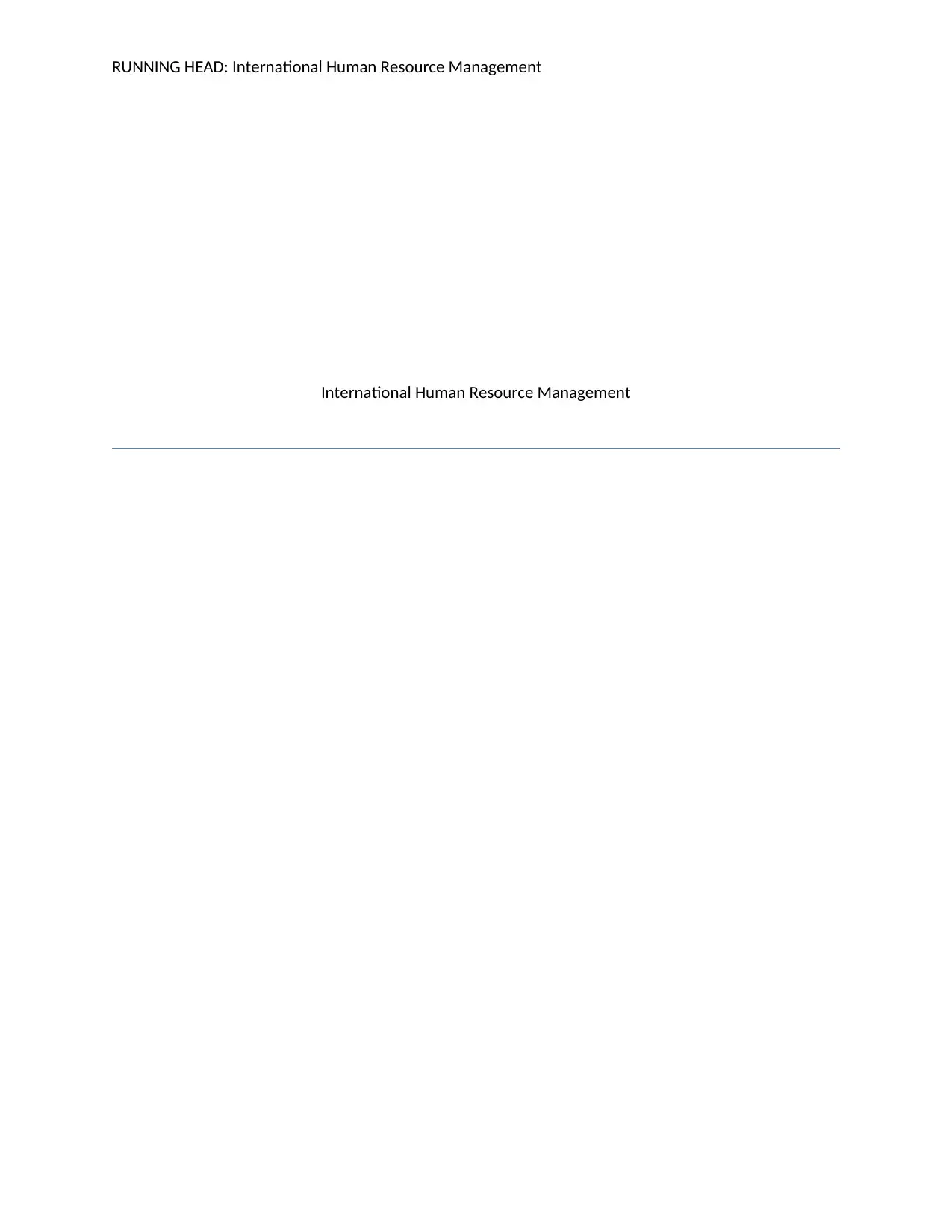
RUNNING HEAD: International Human Resource Management
International Human Resource Management
International Human Resource Management
Paraphrase This Document
Need a fresh take? Get an instant paraphrase of this document with our AI Paraphraser
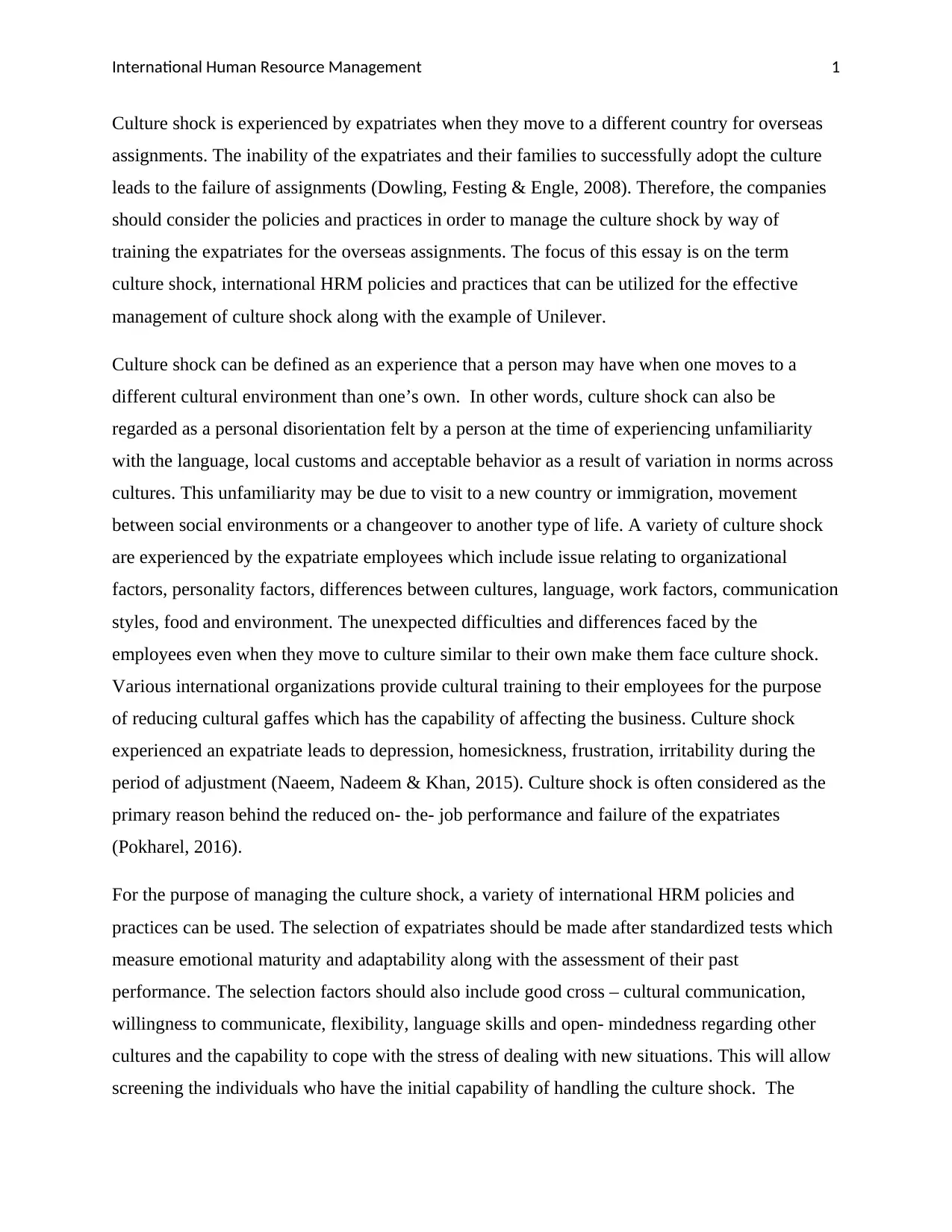
International Human Resource Management 1
Culture shock is experienced by expatriates when they move to a different country for overseas
assignments. The inability of the expatriates and their families to successfully adopt the culture
leads to the failure of assignments (Dowling, Festing & Engle, 2008). Therefore, the companies
should consider the policies and practices in order to manage the culture shock by way of
training the expatriates for the overseas assignments. The focus of this essay is on the term
culture shock, international HRM policies and practices that can be utilized for the effective
management of culture shock along with the example of Unilever.
Culture shock can be defined as an experience that a person may have when one moves to a
different cultural environment than one’s own. In other words, culture shock can also be
regarded as a personal disorientation felt by a person at the time of experiencing unfamiliarity
with the language, local customs and acceptable behavior as a result of variation in norms across
cultures. This unfamiliarity may be due to visit to a new country or immigration, movement
between social environments or a changeover to another type of life. A variety of culture shock
are experienced by the expatriate employees which include issue relating to organizational
factors, personality factors, differences between cultures, language, work factors, communication
styles, food and environment. The unexpected difficulties and differences faced by the
employees even when they move to culture similar to their own make them face culture shock.
Various international organizations provide cultural training to their employees for the purpose
of reducing cultural gaffes which has the capability of affecting the business. Culture shock
experienced an expatriate leads to depression, homesickness, frustration, irritability during the
period of adjustment (Naeem, Nadeem & Khan, 2015). Culture shock is often considered as the
primary reason behind the reduced on- the- job performance and failure of the expatriates
(Pokharel, 2016).
For the purpose of managing the culture shock, a variety of international HRM policies and
practices can be used. The selection of expatriates should be made after standardized tests which
measure emotional maturity and adaptability along with the assessment of their past
performance. The selection factors should also include good cross – cultural communication,
willingness to communicate, flexibility, language skills and open- mindedness regarding other
cultures and the capability to cope with the stress of dealing with new situations. This will allow
screening the individuals who have the initial capability of handling the culture shock. The
Culture shock is experienced by expatriates when they move to a different country for overseas
assignments. The inability of the expatriates and their families to successfully adopt the culture
leads to the failure of assignments (Dowling, Festing & Engle, 2008). Therefore, the companies
should consider the policies and practices in order to manage the culture shock by way of
training the expatriates for the overseas assignments. The focus of this essay is on the term
culture shock, international HRM policies and practices that can be utilized for the effective
management of culture shock along with the example of Unilever.
Culture shock can be defined as an experience that a person may have when one moves to a
different cultural environment than one’s own. In other words, culture shock can also be
regarded as a personal disorientation felt by a person at the time of experiencing unfamiliarity
with the language, local customs and acceptable behavior as a result of variation in norms across
cultures. This unfamiliarity may be due to visit to a new country or immigration, movement
between social environments or a changeover to another type of life. A variety of culture shock
are experienced by the expatriate employees which include issue relating to organizational
factors, personality factors, differences between cultures, language, work factors, communication
styles, food and environment. The unexpected difficulties and differences faced by the
employees even when they move to culture similar to their own make them face culture shock.
Various international organizations provide cultural training to their employees for the purpose
of reducing cultural gaffes which has the capability of affecting the business. Culture shock
experienced an expatriate leads to depression, homesickness, frustration, irritability during the
period of adjustment (Naeem, Nadeem & Khan, 2015). Culture shock is often considered as the
primary reason behind the reduced on- the- job performance and failure of the expatriates
(Pokharel, 2016).
For the purpose of managing the culture shock, a variety of international HRM policies and
practices can be used. The selection of expatriates should be made after standardized tests which
measure emotional maturity and adaptability along with the assessment of their past
performance. The selection factors should also include good cross – cultural communication,
willingness to communicate, flexibility, language skills and open- mindedness regarding other
cultures and the capability to cope with the stress of dealing with new situations. This will allow
screening the individuals who have the initial capability of handling the culture shock. The
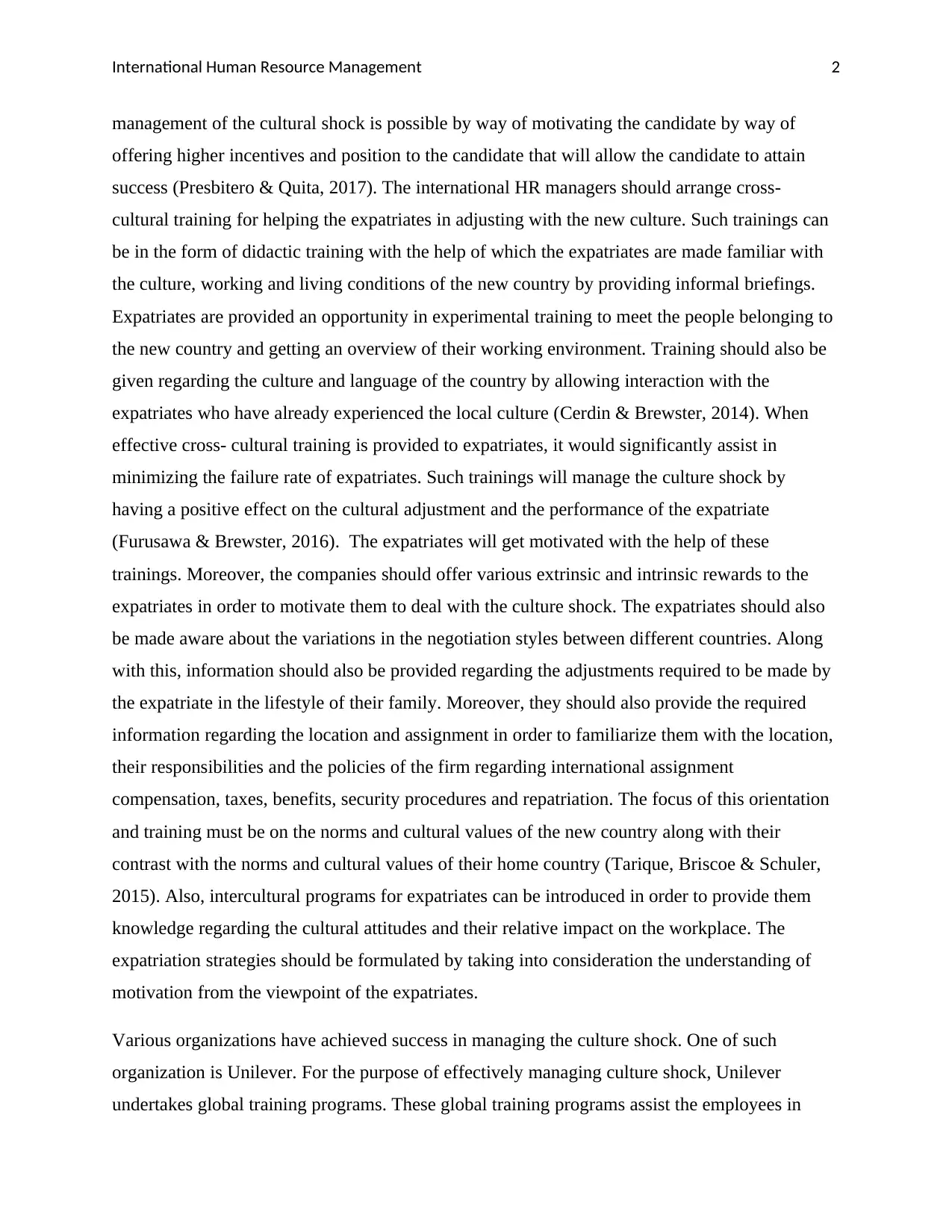
International Human Resource Management 2
management of the cultural shock is possible by way of motivating the candidate by way of
offering higher incentives and position to the candidate that will allow the candidate to attain
success (Presbitero & Quita, 2017). The international HR managers should arrange cross-
cultural training for helping the expatriates in adjusting with the new culture. Such trainings can
be in the form of didactic training with the help of which the expatriates are made familiar with
the culture, working and living conditions of the new country by providing informal briefings.
Expatriates are provided an opportunity in experimental training to meet the people belonging to
the new country and getting an overview of their working environment. Training should also be
given regarding the culture and language of the country by allowing interaction with the
expatriates who have already experienced the local culture (Cerdin & Brewster, 2014). When
effective cross- cultural training is provided to expatriates, it would significantly assist in
minimizing the failure rate of expatriates. Such trainings will manage the culture shock by
having a positive effect on the cultural adjustment and the performance of the expatriate
(Furusawa & Brewster, 2016). The expatriates will get motivated with the help of these
trainings. Moreover, the companies should offer various extrinsic and intrinsic rewards to the
expatriates in order to motivate them to deal with the culture shock. The expatriates should also
be made aware about the variations in the negotiation styles between different countries. Along
with this, information should also be provided regarding the adjustments required to be made by
the expatriate in the lifestyle of their family. Moreover, they should also provide the required
information regarding the location and assignment in order to familiarize them with the location,
their responsibilities and the policies of the firm regarding international assignment
compensation, taxes, benefits, security procedures and repatriation. The focus of this orientation
and training must be on the norms and cultural values of the new country along with their
contrast with the norms and cultural values of their home country (Tarique, Briscoe & Schuler,
2015). Also, intercultural programs for expatriates can be introduced in order to provide them
knowledge regarding the cultural attitudes and their relative impact on the workplace. The
expatriation strategies should be formulated by taking into consideration the understanding of
motivation from the viewpoint of the expatriates.
Various organizations have achieved success in managing the culture shock. One of such
organization is Unilever. For the purpose of effectively managing culture shock, Unilever
undertakes global training programs. These global training programs assist the employees in
management of the cultural shock is possible by way of motivating the candidate by way of
offering higher incentives and position to the candidate that will allow the candidate to attain
success (Presbitero & Quita, 2017). The international HR managers should arrange cross-
cultural training for helping the expatriates in adjusting with the new culture. Such trainings can
be in the form of didactic training with the help of which the expatriates are made familiar with
the culture, working and living conditions of the new country by providing informal briefings.
Expatriates are provided an opportunity in experimental training to meet the people belonging to
the new country and getting an overview of their working environment. Training should also be
given regarding the culture and language of the country by allowing interaction with the
expatriates who have already experienced the local culture (Cerdin & Brewster, 2014). When
effective cross- cultural training is provided to expatriates, it would significantly assist in
minimizing the failure rate of expatriates. Such trainings will manage the culture shock by
having a positive effect on the cultural adjustment and the performance of the expatriate
(Furusawa & Brewster, 2016). The expatriates will get motivated with the help of these
trainings. Moreover, the companies should offer various extrinsic and intrinsic rewards to the
expatriates in order to motivate them to deal with the culture shock. The expatriates should also
be made aware about the variations in the negotiation styles between different countries. Along
with this, information should also be provided regarding the adjustments required to be made by
the expatriate in the lifestyle of their family. Moreover, they should also provide the required
information regarding the location and assignment in order to familiarize them with the location,
their responsibilities and the policies of the firm regarding international assignment
compensation, taxes, benefits, security procedures and repatriation. The focus of this orientation
and training must be on the norms and cultural values of the new country along with their
contrast with the norms and cultural values of their home country (Tarique, Briscoe & Schuler,
2015). Also, intercultural programs for expatriates can be introduced in order to provide them
knowledge regarding the cultural attitudes and their relative impact on the workplace. The
expatriation strategies should be formulated by taking into consideration the understanding of
motivation from the viewpoint of the expatriates.
Various organizations have achieved success in managing the culture shock. One of such
organization is Unilever. For the purpose of effectively managing culture shock, Unilever
undertakes global training programs. These global training programs assist the employees in
⊘ This is a preview!⊘
Do you want full access?
Subscribe today to unlock all pages.

Trusted by 1+ million students worldwide
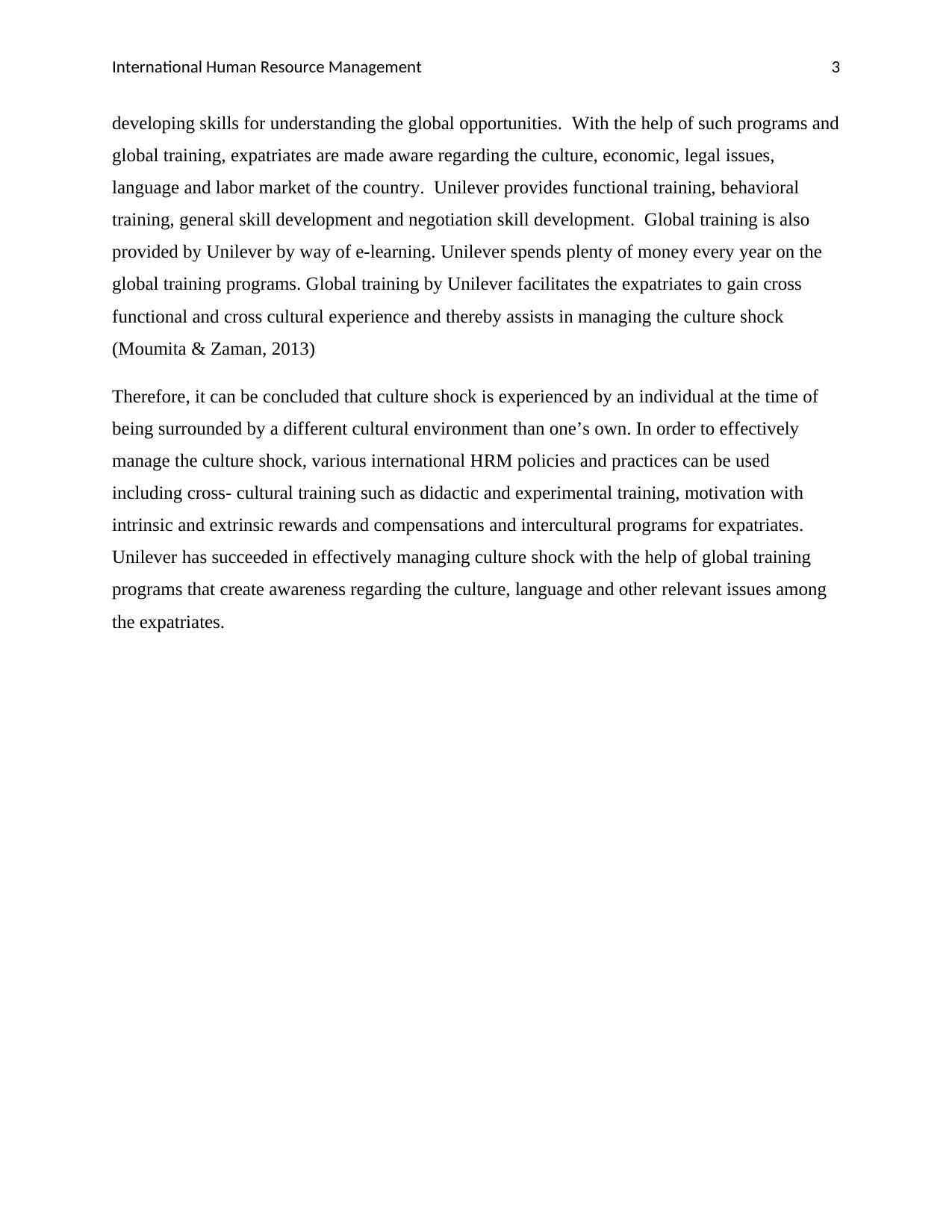
International Human Resource Management 3
developing skills for understanding the global opportunities. With the help of such programs and
global training, expatriates are made aware regarding the culture, economic, legal issues,
language and labor market of the country. Unilever provides functional training, behavioral
training, general skill development and negotiation skill development. Global training is also
provided by Unilever by way of e-learning. Unilever spends plenty of money every year on the
global training programs. Global training by Unilever facilitates the expatriates to gain cross
functional and cross cultural experience and thereby assists in managing the culture shock
(Moumita & Zaman, 2013)
Therefore, it can be concluded that culture shock is experienced by an individual at the time of
being surrounded by a different cultural environment than one’s own. In order to effectively
manage the culture shock, various international HRM policies and practices can be used
including cross- cultural training such as didactic and experimental training, motivation with
intrinsic and extrinsic rewards and compensations and intercultural programs for expatriates.
Unilever has succeeded in effectively managing culture shock with the help of global training
programs that create awareness regarding the culture, language and other relevant issues among
the expatriates.
developing skills for understanding the global opportunities. With the help of such programs and
global training, expatriates are made aware regarding the culture, economic, legal issues,
language and labor market of the country. Unilever provides functional training, behavioral
training, general skill development and negotiation skill development. Global training is also
provided by Unilever by way of e-learning. Unilever spends plenty of money every year on the
global training programs. Global training by Unilever facilitates the expatriates to gain cross
functional and cross cultural experience and thereby assists in managing the culture shock
(Moumita & Zaman, 2013)
Therefore, it can be concluded that culture shock is experienced by an individual at the time of
being surrounded by a different cultural environment than one’s own. In order to effectively
manage the culture shock, various international HRM policies and practices can be used
including cross- cultural training such as didactic and experimental training, motivation with
intrinsic and extrinsic rewards and compensations and intercultural programs for expatriates.
Unilever has succeeded in effectively managing culture shock with the help of global training
programs that create awareness regarding the culture, language and other relevant issues among
the expatriates.
Paraphrase This Document
Need a fresh take? Get an instant paraphrase of this document with our AI Paraphraser
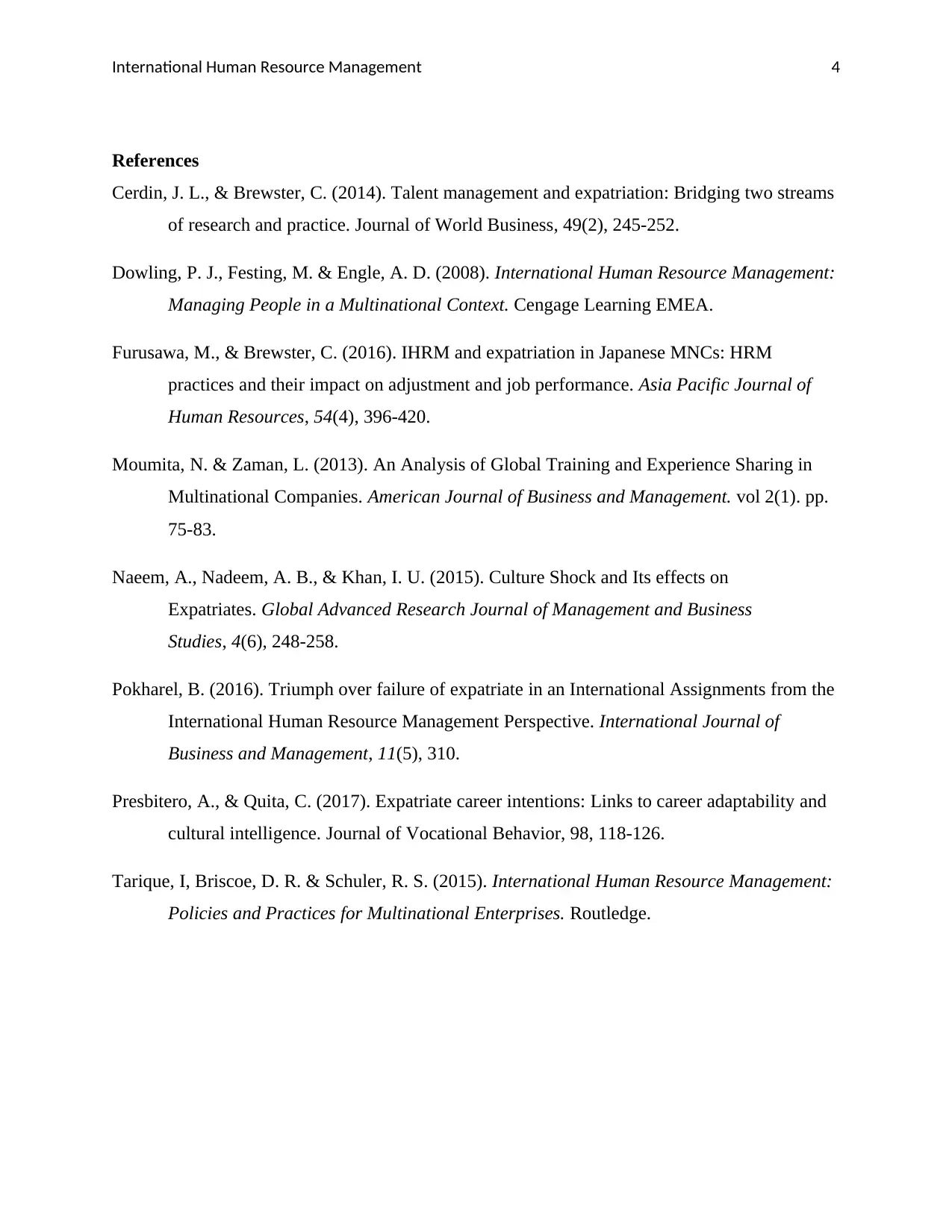
International Human Resource Management 4
References
Cerdin, J. L., & Brewster, C. (2014). Talent management and expatriation: Bridging two streams
of research and practice. Journal of World Business, 49(2), 245-252.
Dowling, P. J., Festing, M. & Engle, A. D. (2008). International Human Resource Management:
Managing People in a Multinational Context. Cengage Learning EMEA.
Furusawa, M., & Brewster, C. (2016). IHRM and expatriation in Japanese MNCs: HRM
practices and their impact on adjustment and job performance. Asia Pacific Journal of
Human Resources, 54(4), 396-420.
Moumita, N. & Zaman, L. (2013). An Analysis of Global Training and Experience Sharing in
Multinational Companies. American Journal of Business and Management. vol 2(1). pp.
75-83.
Naeem, A., Nadeem, A. B., & Khan, I. U. (2015). Culture Shock and Its effects on
Expatriates. Global Advanced Research Journal of Management and Business
Studies, 4(6), 248-258.
Pokharel, B. (2016). Triumph over failure of expatriate in an International Assignments from the
International Human Resource Management Perspective. International Journal of
Business and Management, 11(5), 310.
Presbitero, A., & Quita, C. (2017). Expatriate career intentions: Links to career adaptability and
cultural intelligence. Journal of Vocational Behavior, 98, 118-126.
Tarique, I, Briscoe, D. R. & Schuler, R. S. (2015). International Human Resource Management:
Policies and Practices for Multinational Enterprises. Routledge.
References
Cerdin, J. L., & Brewster, C. (2014). Talent management and expatriation: Bridging two streams
of research and practice. Journal of World Business, 49(2), 245-252.
Dowling, P. J., Festing, M. & Engle, A. D. (2008). International Human Resource Management:
Managing People in a Multinational Context. Cengage Learning EMEA.
Furusawa, M., & Brewster, C. (2016). IHRM and expatriation in Japanese MNCs: HRM
practices and their impact on adjustment and job performance. Asia Pacific Journal of
Human Resources, 54(4), 396-420.
Moumita, N. & Zaman, L. (2013). An Analysis of Global Training and Experience Sharing in
Multinational Companies. American Journal of Business and Management. vol 2(1). pp.
75-83.
Naeem, A., Nadeem, A. B., & Khan, I. U. (2015). Culture Shock and Its effects on
Expatriates. Global Advanced Research Journal of Management and Business
Studies, 4(6), 248-258.
Pokharel, B. (2016). Triumph over failure of expatriate in an International Assignments from the
International Human Resource Management Perspective. International Journal of
Business and Management, 11(5), 310.
Presbitero, A., & Quita, C. (2017). Expatriate career intentions: Links to career adaptability and
cultural intelligence. Journal of Vocational Behavior, 98, 118-126.
Tarique, I, Briscoe, D. R. & Schuler, R. S. (2015). International Human Resource Management:
Policies and Practices for Multinational Enterprises. Routledge.
1 out of 5
Related Documents
Your All-in-One AI-Powered Toolkit for Academic Success.
+13062052269
info@desklib.com
Available 24*7 on WhatsApp / Email
![[object Object]](/_next/static/media/star-bottom.7253800d.svg)
Unlock your academic potential
Copyright © 2020–2026 A2Z Services. All Rights Reserved. Developed and managed by ZUCOL.




